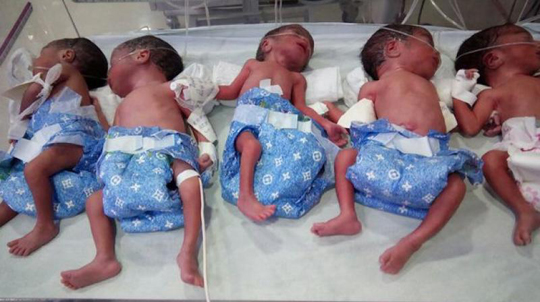Raipur, Apr 3: In what Chhattisgarh doctors claimed to be the first case in India, a woman gave birth to Quintuplets (five babies at once), that too in just six months of pregnancy.

All the pre-mature baby girls who were born at district hospital in Ambikapur on Saturday morning have been kept in Neo-natal Intensive Care Unit (NICU) because of their low-birth weight.
The hospital staff called them "five star" babies and rightly so because they are probably the "most premature" quintuplets babies born in India so far. The proud parents, 25-year-old Manita Kumari and her husband Mahesh are happy to have five baby girls and are praying for each child to remain alive.
Manita is a house-wife and had lost her first pre-mature child after three months of her birth in 2014.
The babies born through normal delivery, around 10 am on Saturday, are so tiny that they could fit in single tray. Even being the pre-mature quintuplets, all the body parts of the new born are fully developed. For the record, a foetus's lungs, brain and eyes are hardly fully developed in the fifth month or the second trimester. The one with the lowest weight among the five is of 1 kg while the heaviest is of 1.5 kg.
"Our gynaecologist's observation says that the babies are premature and took birth in between six to seven months of pregnancy. They all have very low birth weight (LBW) and the survival of such LBW children in the best of hospitals is abysmally low," said Dr NP Pandey, chief superintendent of Ambikapur district hospital.




Comments
Congratulations
May Allah protect them and give them good health , so that they can be seen as a proud 5 star childrens of their creator.
Add new comment